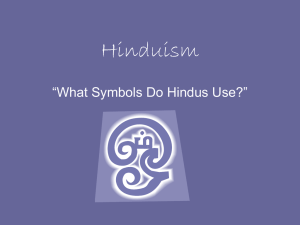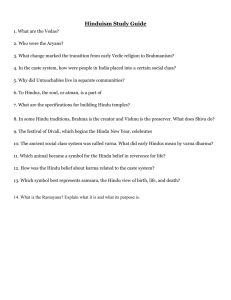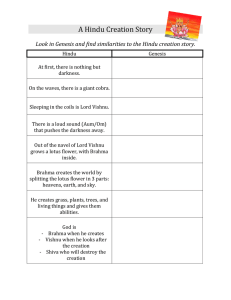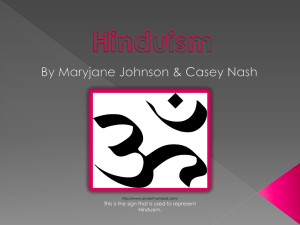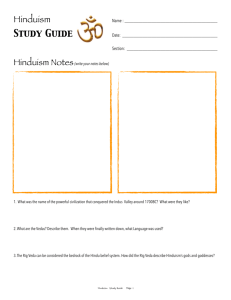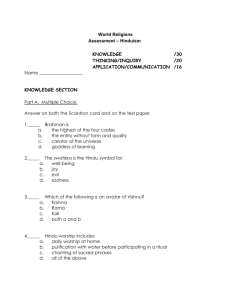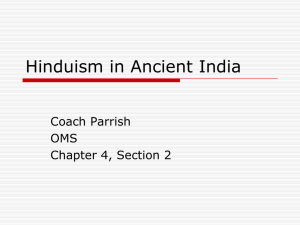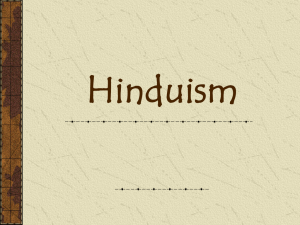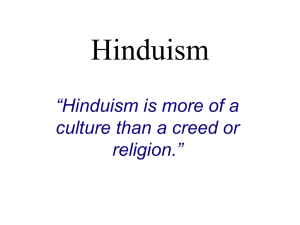Hinduism
advertisement
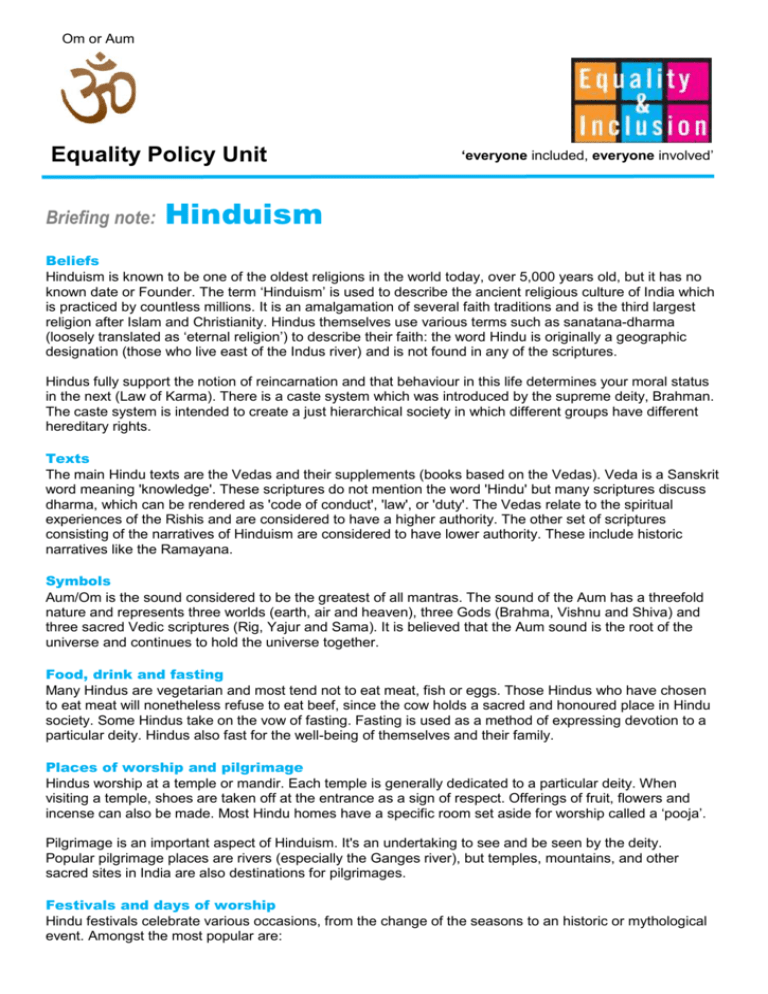
Om or Aum Equality Policy Unit Briefing note: ‘everyone included, everyone involved’ Hinduism Beliefs Hinduism is known to be one of the oldest religions in the world today, over 5,000 years old, but it has no known date or Founder. The term ‘Hinduism’ is used to describe the ancient religious culture of India which is practiced by countless millions. It is an amalgamation of several faith traditions and is the third largest religion after Islam and Christianity. Hindus themselves use various terms such as sanatana-dharma (loosely translated as ‘eternal religion’) to describe their faith: the word Hindu is originally a geographic designation (those who live east of the Indus river) and is not found in any of the scriptures. Hindus fully support the notion of reincarnation and that behaviour in this life determines your moral status in the next (Law of Karma). There is a caste system which was introduced by the supreme deity, Brahman. The caste system is intended to create a just hierarchical society in which different groups have different hereditary rights. Texts The main Hindu texts are the Vedas and their supplements (books based on the Vedas). Veda is a Sanskrit word meaning 'knowledge'. These scriptures do not mention the word 'Hindu' but many scriptures discuss dharma, which can be rendered as 'code of conduct', 'law', or 'duty'. The Vedas relate to the spiritual experiences of the Rishis and are considered to have a higher authority. The other set of scriptures consisting of the narratives of Hinduism are considered to have lower authority. These include historic narratives like the Ramayana. Symbols Aum/Om is the sound considered to be the greatest of all mantras. The sound of the Aum has a threefold nature and represents three worlds (earth, air and heaven), three Gods (Brahma, Vishnu and Shiva) and three sacred Vedic scriptures (Rig, Yajur and Sama). It is believed that the Aum sound is the root of the universe and continues to hold the universe together. Food, drink and fasting Many Hindus are vegetarian and most tend not to eat meat, fish or eggs. Those Hindus who have chosen to eat meat will nonetheless refuse to eat beef, since the cow holds a sacred and honoured place in Hindu society. Some Hindus take on the vow of fasting. Fasting is used as a method of expressing devotion to a particular deity. Hindus also fast for the well-being of themselves and their family. Places of worship and pilgrimage Hindus worship at a temple or mandir. Each temple is generally dedicated to a particular deity. When visiting a temple, shoes are taken off at the entrance as a sign of respect. Offerings of fruit, flowers and incense can also be made. Most Hindu homes have a specific room set aside for worship called a ‘pooja’. Pilgrimage is an important aspect of Hinduism. It's an undertaking to see and be seen by the deity. Popular pilgrimage places are rivers (especially the Ganges river), but temples, mountains, and other sacred sites in India are also destinations for pilgrimages. Festivals and days of worship Hindu festivals celebrate various occasions, from the change of the seasons to an historic or mythological event. Amongst the most popular are: Om or Aum Diwali the Hindu festival of lights, is the most popular of all the festivals, it celebrates the victory of good over evil, light over darkness and knowledge over ignorance. Diwali extends over five days, because of the lights, fireworks and sweets involved, it's a great favourite. It is also an occasion for celebration by Jains and Sikhs. It usually falls in October or November. Holi was originally a spring festival of fertility and harvest, it is a colourful festival, with dancing, singing, and throwing of powder paint and coloured water, the festival is usually held in February/ March. Navaratri (nine nights) is one of the greatest Hindu festivals. It symbolises the triumph of good over evil. Navratri takes place at the beginning of October around harvest time and, as the name implies, this festival is celebrated for nine days. Rama Navami this festival celebrates the birth of the Lord Rama and occurs in April. Krishna Javanti celebrates the birth of Lord Krishna in August/September. Q For further information on faith dates and religious festivals follow this link: http://www.equality.leeds.ac.uk/forstaff/good-practice-guidance/faith-calendar-and-dates-of-religious-festivals/ This information sheet was produced using information found in the ‘Faith Communities Navigator’ published in 2007 by the Faith Regen Foundation. Further information about the Foundation is available by following this link http://www.thefrf.org/work/archive. QWe have also used information taken from the BBC Religion website, follow the link for further information http://www.bbc.co.uk/religion/
